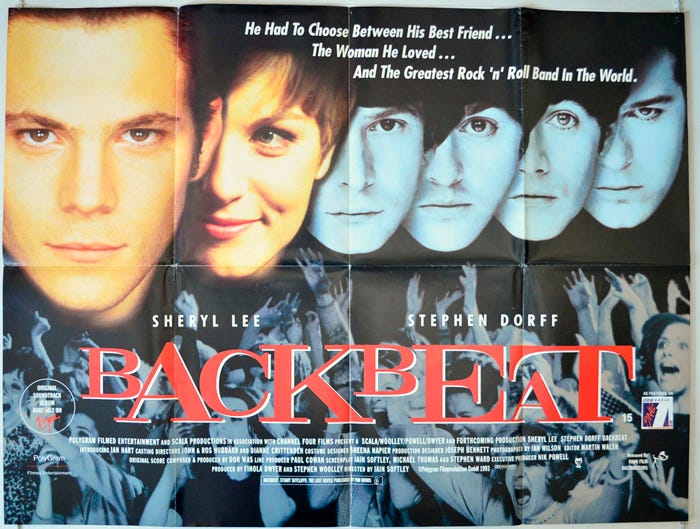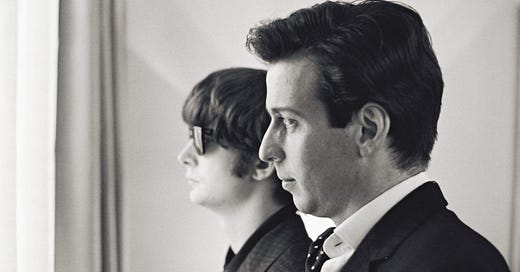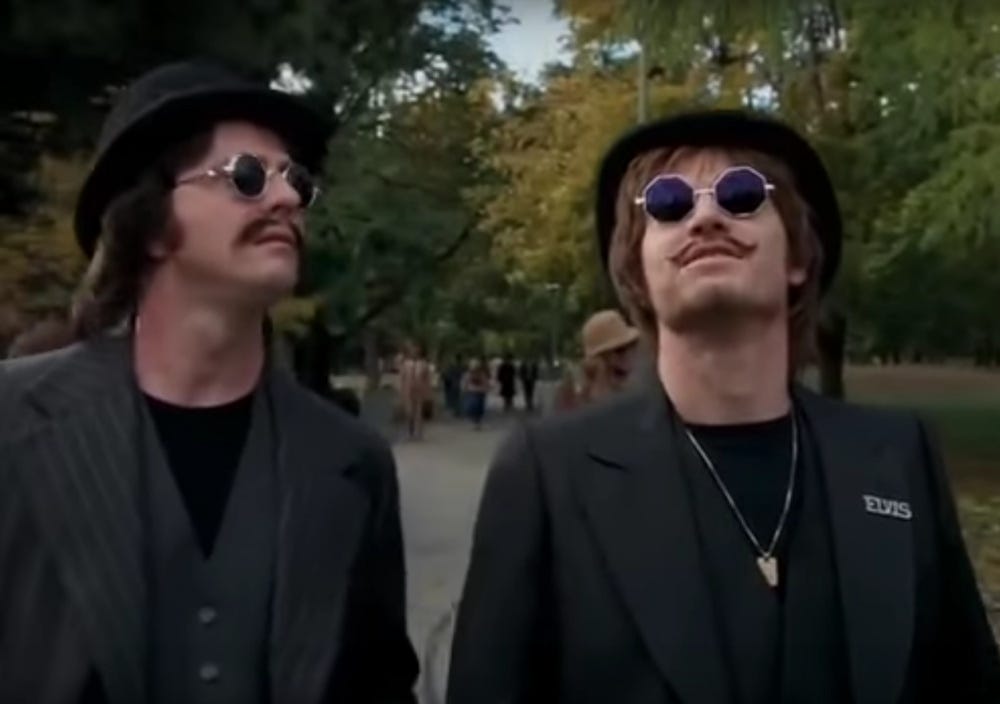The Beatles cinematic universe
A selective jaunt through the narrative film offerings.
It’s no surprise when The Beatles receive syndicated news rollouts, and most recently the news is that their “full life rights” have been sold, and Sam Mendes will be directing a feature on each Beatle.
I’ve no doubt these authorized biopics will likely be clogging up awards seasons and online discourse for years to come, but until then there is already a cinematic universe to visit, and narrative medleys to untangle.

Backbeat (1994) d. Iain Softley
Backbeat tops a few best-of lists of Beatles narrative films, covering the early years of gigging in Hamburg. The band’s hustle is the backdrop to the real A-plotline of then bassist Stuart Sutcliffe falling in love with photographer Astrid Kirchherr, and being torn between the Hamburg art scene and her and the band.
The poster tagline, “he had to choose between his best friend and the woman he loved” refers to Sutcliffe being torn between John Lennon and Kirchherr. Those familiar with history know that he did end up leaving the band, getting engaged to Kirchherr and attending art school before dying of a brain hemorrhage in 1962, before the Beatles were through with Hamburg.
This tragedy looming on the horizon provides a heftier weight to the film—something I feel like it squanders, but that may be my cynicism and aversion to melodramatic death scenes.
It’s a movie that Paul McCartney complained about in 1995, on the heels of its release, stating,
“[T]hey’ve actually taken my rock ‘n’ rollness off me. They give John the song ‘Long Tall Sally’ to sing and he never sang it in his life. But now it’s set in cement. It’s like The Buddy Holly and Glenn Miller stories. The Buddy Holly Story does not even mention Norman Petty, and The Glenn Miller Story is a sugarcoated version of his life. Now Backbeat has done the same thing to the story of the Beatles.”
I find this complaint worth mentioning because Backbeat isn’t the first film about the band, and it most certainly wasn’t going to be the last. So how “set in cement” is the narrative? It’s malleable, it’s just a question of tolerating the discrepancies when they arrive.
The narrative is malleable for as long as there are people out there pumping out stories and people are absorbing them.
Yesterday (2019) / Cover Version (original screenplay, 2016)
Neither the completed film Yesterday nor the original screenplay it was based on is really about The Beatles as a band—it’s about them as a phenomenon and about the mythos of their genius.
Cover Version was written by Jack Barth and sold to rom-com king Richard Curtis.1 Curtis took the premise of a world where a struggling musician discovers reality has been altered and The Beatles have been erased, and he sets out to claim their music as his own.
In Barth’s version, the “new” music our main character pumps out breathes life into his career, but it doesn’t lead to superstardom. Hubris strikes and our main character becomes increasingly bitter that the greatest music of all time isn’t immediately earning him the accolades he believes the music deserves.
In Curtis’ version, superstardom comes overnight. Our main character is ushered past the velvet ropes with the help of Ed Sheeran, who cowers at the genius songwriting he’s presented with. There’s a romantic subplot, of course, but mostly the purpose of this version seems to be that The Beatles’ genius transcends all.
While some might think that Barth’s version is insulting to the Beatles’ legacy I think it’s Curtis that insults their accomplishments. Are we so detached from the mechanics of the real world that we believe sheet music detached from context is the key to success?
Carson Reeves of Scriptshadow reviewed Cover Version and gave it a mostly favorable review, but concluded that Yesterday was still better because it delivers what the audience wants. Barth’s version may have been more realistic, but “it didn’t give me that big whirlwind celebrity experience that Curtis’s version did.”
Two of Us (2000) d. Michael Lindsay-Hogg
Two Of Us is often referred to as the McLennon fanfiction film, but it is also held up as a more true depiction of the Lennon/McCartney relationship because its director, Michael Lindsay-Hogg also helmed the 1970 documentary Let It Be.
This means Lindsay-Hogg knows the real them, he possesses “secret knowledge” that the expectant audience can absorb through the screen. And he delivers a John & Paul kiss—a jokey one, sure, but a kiss is a kiss. And if the guy who knew them thinks it happened, that’s all we need to know, isn’t it?
The plot of the film takes its cue from lore: in 1976, Lorne Michaels came on SNL and offered the Beatles money for a reunion. The story goes that Lennon and McCartney actually were watching the show live in Lennon’s New York apartment and they almost went down to the studio together.
Because the story came from Lennon it has been heralded as absolute truth. The film fills in the gaps, including a lot of bickering and joshing around, as well as too many on-the-nose fan encounters to make it anything other than a wish-fulfillment film.
Despite the framing of the film as “fan fiction” and its embrace by shippers, it’s not one that McCartney has expressed any problems with. He discussed it on Adam Buxton’s podcast in 2020 and said he wished what happened in the film had happened in reality.
McCartney also specified that he and Lennon did not catch SNL live: yes, he visited Lennon in New York, but it was after it had already happened. He said on the podcast, “It was kind of true, but the facts have been mangled to protect the innocent.”
Who the innocent are in this scenario is a bit of a mystery to me. Perhaps it’s not so much the innocent that needs to be protected, but those invested. Protecting what people want to believe.
The Hours and Times (1991) d. Christopher Munch
Christopher Munch’s film takes a real event, an infamous vacation to Spain that Lennon and manager Brian Epstein took, and imagines what might have happened.
This trip has been fodder for speculation since it happened, with rumors of the two getting it on, and as a turning point where Lennon became more favored in Epstein’s treatment of the band.
The film is treated as queer cinema, even though it is mostly an exploration of sexuality and sexual roles, featuring an awkward, aborted make-out session. Film-Lennon was ultimately not really into it. If this was published as fanfiction, it would earn the label of “pre-slash” because it’s exploratory rather than definitive.
But the film is still considered a confirmation of something more, just like McLennon shippers took McCartney’s 2018 admission of group masturbation sessions as confirmation of an ongoing relationship.
What Lennon said about the trip was more provocative than what the film gives us. In a 1980 interview with David Sheff, he said, “Well, it was almost a love affair, but not quite. It was never consummated. But it was a pretty intense relationship.” On a separate occasion, he also claimed that he allowed Epstein to give him a hand job.
In 2015, The Daily Beast interviewed Yoko Ono and teased it as Ono revealing “the truth about Lennon’s bisexuality,” because that’s still being litigated. I found one of her comments particularly interesting: “I mean, both John and I thought it was good that people think we were bisexual, or homosexual.”
When discussing what Lennon said about the trip to Spain, she said, “But of course he would say that.”
Is it a surprise that queer baiting has taken off astronomically when perceived queerness was a benefit decades before it became mainstream?
One review on Letterboxd says, “Nothing like this may have ever happened, but after seeing this, I kind of want to believe that it did,” which echoes what McCartney himself said about Two of Us.
These stories exist to offer an alternate history, to evoke and imprint a more favorable version of history. We might not have experienced it firsthand, but that second-hand knowing is powerful
Where Sam Mendes’ quartet will fit in remains to be seen.







The better you are as an artist the worse your biopic will be. Biopics, like the worst documentaries, are ego porn. Like Paul Stanley said, The Eagles are good but do you want to see a film about them? No .
Now I would see a film about KISS, The Ramones or Fleetwood Mac. The kabuki, the fake family dynamic and the drama respectively make for great films.